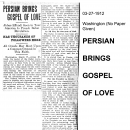Main menu
- ‘Abdu’l-Bahá’s Journey
- World Peace
- Stopping Racism in America
- Empowerment of Women
- More Principles...
- Prayer for America
Persian Brings Gospel of Love
Abbas Effendi Soon to Tour America to Preach Bahá’í Revelation.
HAS THOUSANDS OF FOLLOWERS HERE
All Creeds May Meet Upon a Common Ground in This Faith.
Washington, March 27. — Abbas Effendi, the leader of the Bahá’í movement and interpreter of its revelation, will arrive in New York in the early spring for a tour of America. Preparations are being made for his entertainment, in the various cities he will visit, among the followers of the movement and others who are interested in the cause of universal peace and the advancement of the world.
The Bahá’ís believe that universal peace is possible only through the harmonizing of religious differences among all races and nations. They teach that all religions were of divine origin and that all have been more or less corrupted, after the lapse of centuries, by theology and dogma. Therefore the truth of religion should be simplified and each religionist carried back to the first principles of his own system. Since the fundamental basis of each system is the same as that of every other, Jews, Christians, Mohammedans and Hindoos, if they live up in each ease to the potentialities of their own creeds, will find themselves meeting upon a common basis of service and love.
So All May Be Servants of God.
The Bahá’í revelation has been given to mankind, they say, to teach this great lesson. It is not enough, they argue that men should theorize and argue among themselves about creeds, but let them live the life, such as was taught by the founder of their religion. They will thus find themselves drawn together by the vital force of the spirit and will find themselves the servants of each other and the servants of God likewise.
It is stated that in Persia, where the movement started about 67 years ago, there have been no less than 20,000 martyrs. Abbas Effendi himself the third of the trinity of leaders of Bahá’ísm, was a prisoner of the Turkish and Persian governments from the age of nine until the revolution of the Young Turks a few years ago. The sultan, ‘Abdul Hamid, sentenced him to prison for life.
Put the Founder to Death.
So great was the fanaticism of the Moslems that they regarded any liberal tendencies as a mark of infidel and visited it with the most cruel punishments. Such was their narrowness and prejudice when Ali Mohammed, who took unto himself the spiritual title of the Báb, arose among the Persians in 1844. He was put to death and his successor, Bahá’u’lláh died in prison in 1892.
Abbas Effendi or ‘Abdu’l-Bahá since that time led the movement. He was born in 1844, on the, very day the Báb made his declaration. While a prisoner at Akka he was visited by persons from both Europe and America who were attracted by his fame as a teacher and went in search of light.
It is estimated that about one-thirtieth of the Persians are now Bahá’ís, who represent the enterprising and progressive element among them. Besides these, the movement is now known and advocated in all parts of the wold. From the time of the World’s Fair in Chicago, when it first became known in America, the number of the friends of the movement has steadily increased, so that now Bahá’í assemblies may be found in most large cities the country.
Creed no Bar to Its Acceptance.
One great advantage which it has over other movements which advocate liberalism is that it does not force people to leave their churches. Its followers are commanded to mix freely with the people of all religions and take the Bahá’í spirit of love and service into whatever fraternities organizations they may be connected with.









